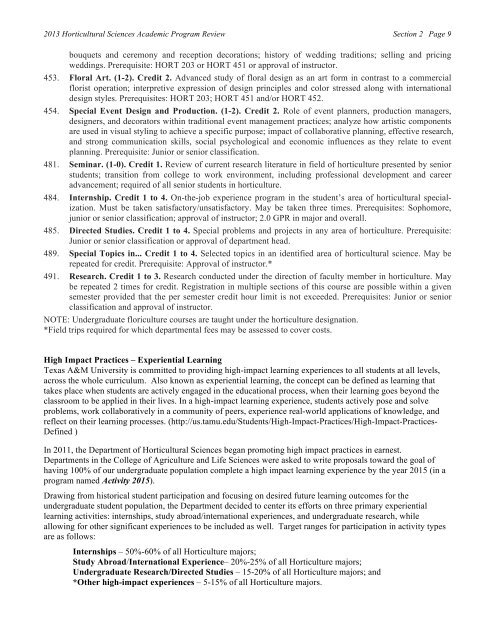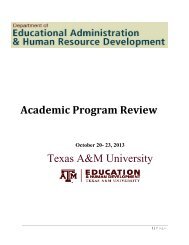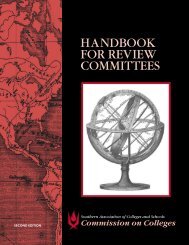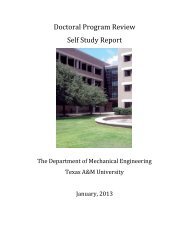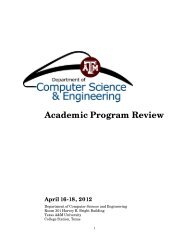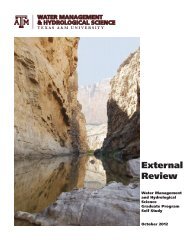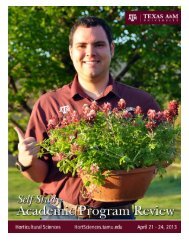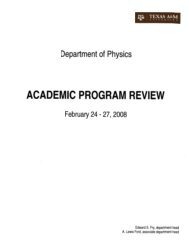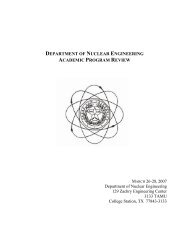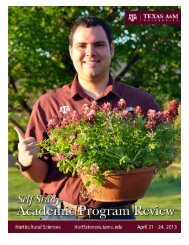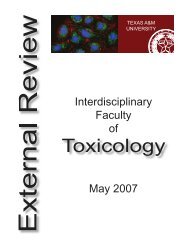its - Office of the Provost and Executive Vice President for Academic ...
its - Office of the Provost and Executive Vice President for Academic ...
its - Office of the Provost and Executive Vice President for Academic ...
Create successful ePaper yourself
Turn your PDF publications into a flip-book with our unique Google optimized e-Paper software.
2013 Horticultural Sciences <strong>Academic</strong> Program Review Section 2 Page 9<br />
bouquets <strong>and</strong> ceremony <strong>and</strong> reception decorations; history <strong>of</strong> wedding traditions; selling <strong>and</strong> pricing<br />
weddings. Prerequisite: HORT 203 or HORT 451 or approval <strong>of</strong> instructor.<br />
453. Floral Art. (1-2). Credit 2. Advanced study <strong>of</strong> floral design as an art <strong>for</strong>m in contrast to a commercial<br />
florist operation; interpretive expression <strong>of</strong> design principles <strong>and</strong> color stressed along with international<br />
design styles. Prerequisites: HORT 203; HORT 451 <strong>and</strong>/or HORT 452.<br />
454. Special Event Design <strong>and</strong> Production. (1-2). Credit 2. Role <strong>of</strong> event planners, production managers,<br />
designers, <strong>and</strong> decorators within traditional event management practices; analyze how artistic components<br />
are used in visual styling to achieve a specific purpose; impact <strong>of</strong> collaborative planning, effective research,<br />
<strong>and</strong> strong communication skills, social psychological <strong>and</strong> economic influences as <strong>the</strong>y relate to event<br />
planning. Prerequisite: Junior or senior classification.<br />
481. Seminar. (1-0). Credit 1. Review <strong>of</strong> current research literature in field <strong>of</strong> horticulture presented by senior<br />
students; transition from college to work environment, including pr<strong>of</strong>essional development <strong>and</strong> career<br />
advancement; required <strong>of</strong> all senior students in horticulture.<br />
484. Internship. Credit 1 to 4. On-<strong>the</strong>-job experience program in <strong>the</strong> student’s area <strong>of</strong> horticultural specialization.<br />
Must be taken satisfactory/unsatisfactory. May be taken three times. Prerequisites: Sophomore,<br />
junior or senior classification; approval <strong>of</strong> instructor; 2.0 GPR in major <strong>and</strong> overall.<br />
485. Directed Studies. Credit 1 to 4. Special problems <strong>and</strong> projects in any area <strong>of</strong> horticulture. Prerequisite:<br />
Junior or senior classification or approval <strong>of</strong> department head.<br />
489. Special Topics in... Credit 1 to 4. Selected topics in an identified area <strong>of</strong> horticultural science. May be<br />
repeated <strong>for</strong> credit. Prerequisite: Approval <strong>of</strong> instructor.*<br />
491. Research. Credit 1 to 3. Research conducted under <strong>the</strong> direction <strong>of</strong> faculty member in horticulture. May<br />
be repeated 2 times <strong>for</strong> credit. Registration in multiple sections <strong>of</strong> this course are possible within a given<br />
semester provided that <strong>the</strong> per semester credit hour limit is not exceeded. Prerequisites: Junior or senior<br />
classification <strong>and</strong> approval <strong>of</strong> instructor.<br />
NOTE: Undergraduate floriculture courses are taught under <strong>the</strong> horticulture designation.<br />
*Field trips required <strong>for</strong> which departmental fees may be assessed to cover costs.<br />
High Impact Practices – Experiential Learning<br />
Texas A&M University is committed to providing high-impact learning experiences to all students at all levels,<br />
across <strong>the</strong> whole curriculum. Also known as experiential learning, <strong>the</strong> concept can be defined as learning that<br />
takes place when students are actively engaged in <strong>the</strong> educational process, when <strong>the</strong>ir learning goes beyond <strong>the</strong><br />
classroom to be applied in <strong>the</strong>ir lives. In a high-impact learning experience, students actively pose <strong>and</strong> solve<br />
problems, work collaboratively in a community <strong>of</strong> peers, experience real-world applications <strong>of</strong> knowledge, <strong>and</strong><br />
reflect on <strong>the</strong>ir learning processes. (http://us.tamu.edu/Students/High-Impact-Practices/High-Impact-Practices-<br />
Defined )<br />
In 2011, <strong>the</strong> Department <strong>of</strong> Horticultural Sciences began promoting high impact practices in earnest.<br />
Departments in <strong>the</strong> College <strong>of</strong> Agriculture <strong>and</strong> Life Sciences were asked to write proposals toward <strong>the</strong> goal <strong>of</strong><br />
having 100% <strong>of</strong> our undergraduate population complete a high impact learning experience by <strong>the</strong> year 2015 (in a<br />
program named Activity 2015).<br />
Drawing from historical student participation <strong>and</strong> focusing on desired future learning outcomes <strong>for</strong> <strong>the</strong><br />
undergraduate student population, <strong>the</strong> Department decided to center <strong>its</strong> ef<strong>for</strong>ts on three primary experiential<br />
learning activities: internships, study abroad/international experiences, <strong>and</strong> undergraduate research, while<br />
allowing <strong>for</strong> o<strong>the</strong>r significant experiences to be included as well. Target ranges <strong>for</strong> participation in activity types<br />
are as follows:<br />
Internships – 50%-60% <strong>of</strong> all Horticulture majors;<br />
Study Abroad/International Experience– 20%-25% <strong>of</strong> all Horticulture majors;<br />
Undergraduate Research/Directed Studies – 15-20% <strong>of</strong> all Horticulture majors; <strong>and</strong><br />
*O<strong>the</strong>r high-impact experiences – 5-15% <strong>of</strong> all Horticulture majors.


